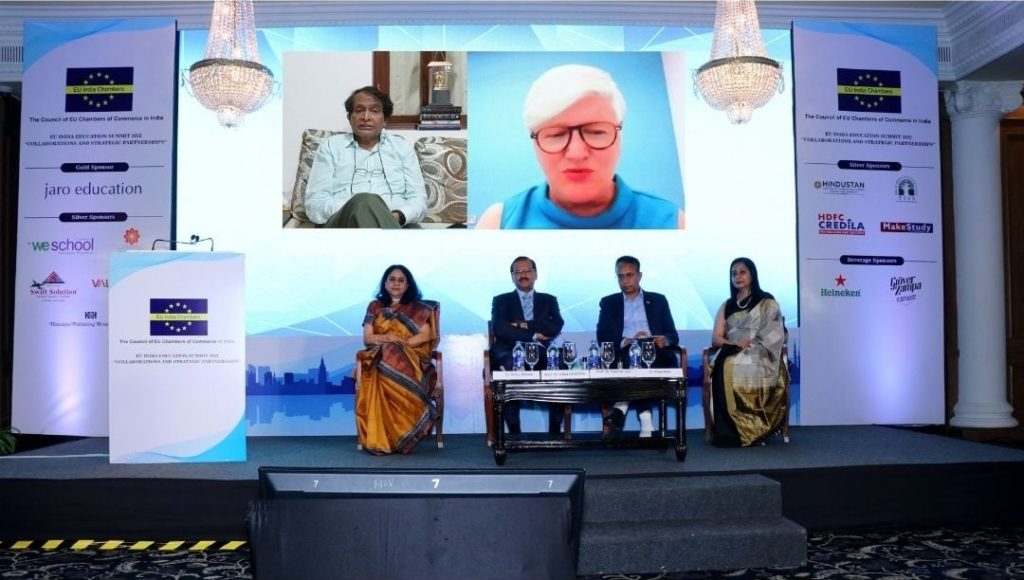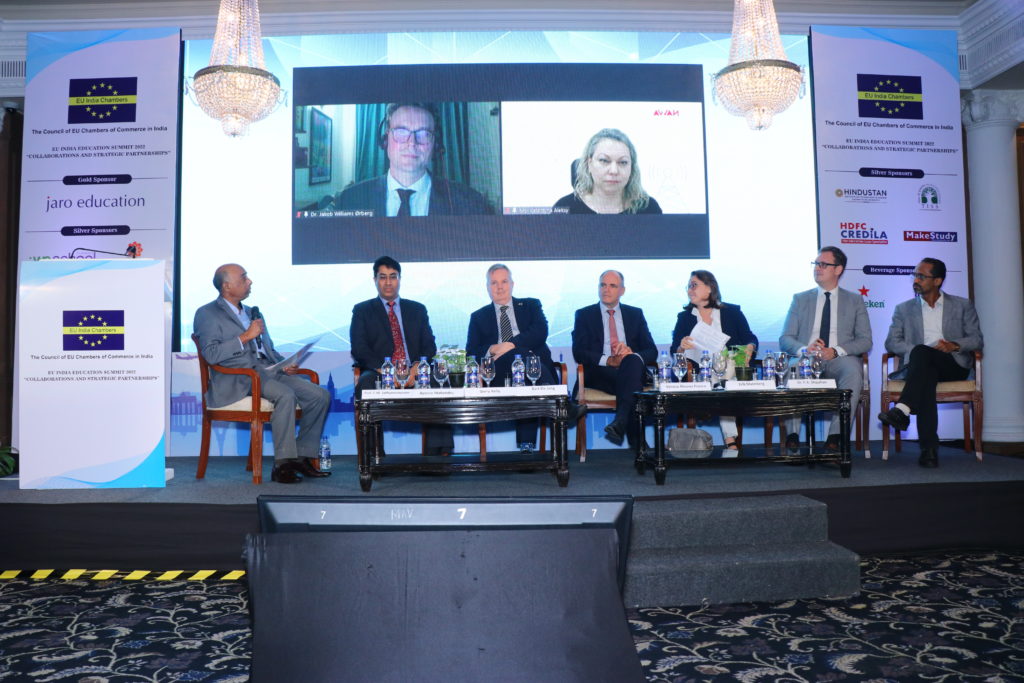Mumbai, 7th April 2022: The Council of EU Chambers of Commerce in India hosted the EU India Education Summit 2022 to discuss “Collaborations and Strategic Partnerships” and understand the growing opportunities for Indian students in Europe.
The Summit aimed to foster a long-term sustainable partnership with Academia, Research Organizations, Industry and Government Representatives from Europe and India for Internationalization of higher education.
Prof. Dr. Uday Salunkhe, Chairman, Education Committee EU Chambers and Group Director Welingkar Institute of Management Development and Research and Dr. Renu Shome, Director, The Council of EU Chambers of Commerce in India welcomed esteemed guests and dignitaries to the event. Prof. Dr. Rajnish Jain, Secretary and CVO, University Grants Commission (UGC), New Delhi who was the Guest of Honour graced the gathering by his presence. Mr. Suresh P Prabhu, Member of Parliament (Rajya Sabha), Chief Guest and Dr. Michelle Stewart, President, European Association for International Education (EAIE) joined the event virtually.

Shri Suresh Prabhu, Member of Parliament (Rajya Sabha) Chief Guest firstly thanked Dr. Shome and the Chamber, which is trying to be a bridge between EU and India. EU is a very important trading block for India. However, it is not a relationship only confined to trade; it also shares some common values. All the members of EU, our democracies believe in certain human rights, certain principles and we work on many multilateral forums to promote public common goals like environment, EU and India share a common vision of better world through adopting sustainable policies, reduce greenhouse emission, and save marine biodiversity restore some marine biodiversity, which is terrestrial. All of these can happen through cooperation, which is necessary at all fields. Particularly which Dr. Shome is trying to promote is extremely important, because ultimately business, commerce industry has an ability to change narratives of economic thinking.
One can be a micro economic thinker; other would have actual practical ideas, which can be implemented by industry. He also mentioned that many European companies have been in India for ages and they have become household names, so these companies are now indianized in a way and they think from India’s perspective. Therefore, these are the right ambassadors of promoting this relationship because they can tell the counterparts in EU about what could be done in India, what is right thing to do in India, and same thing can happen about Indian companies who are settled in EU countries. We should also try to promote small and medium enterprises from both India and EU to do business more and more with each other. There is a scope of services and the opportunity is immense. He later mentioned that, while working for last 26 years he has always tried to promote relation between EU and India, even when he became commerce minister he tried to have a trade deal between EU and India that is still in progress.
Prof. Dr. Rajnish Jain, Secretary and CVO, University Grants Commission (UGC), New Delhi, mentioned that India and EU countries, we share great value in terms of diplomacy, democracy, human rights and we have common interest in each other’s prosperity, progress, sustainable development and also we are collaborating to various platforms for internationalization of higher education. He also shared insights on what is happening on National Education Policy (NEP). NEP is very transformative in nature and based on the pillar of risk to access, equity, quality, affordability and accountability. It focuses on few things, which are very important in higher education like holistic multidisciplinary, futuristic, flexible, experiential and value based higher education. One of the major reforms in NEP is trying to promote multidisciplinary in a big way and encouraging single stream and limited stream institutions to broaden themselves and become multidisciplinary. We are also trying to encourage the flexibility through defining credits and trying to provide a technology platform with the help of academic bank of credits, so that flexibility generates. In addition, we are trying to create multiple exit and entry pathways for students from courses. In line with the global framework, we are revising our curriculum credit structure, to make it more comparable with the global level we have brought out 4-year degree programme at undergraduate level. In order to promote employability one very important step taken is apprenticeship and internship embedded degree programmes.
Dr. Michelle Stewart, President, European Association for International Education (EAIE), spoke about enhancement in collaborations between EU and India. She briefly introduced about EAIE organisation. There are important synergies between EU and India, notably in relation to mobility, co-operational research and innovation and institutional partnerships. Collaborations and partnerships are vital in globalized world where we live and work, but it is especially important in arena of higher education. Through internationalization, we can create connections between higher education and all of the different sectors. Our governments in higher educational institutions are profoundly responsible for moving students into India and Europe who rely on our educational systems. . Statistically, there is Eighty thousand students current mobility in Europe and most popular country UK. Participation in countries like Germany, Spain and France the numbers are quite significant. She mentioned that according to her statistics there are about Fifty thousand students in India, the highest numbers is coming from the neighboring countries. Countries like France have specific goals and specific initiatives to increase the number. Some of them are EU-India strategic partnerships and roadmaps launched in July 2020, New EU India initiative launched at enhanced cooperation in areas like science, 2020 and EU connectivity partnerships signed in 2021.

The Inaugural session followed by a panel discussion. The Panelists were Dr. Jakob Williams Ørberg, Counsellor for Innovation, Research and Higher Education, Royal Danish Embassy; Mr. Apoorv Mahendru, Deputy Director, DAAD Regional Office, New Delhi; Mr. Gerry Kelly, Consul General, Consulate General of Ireland; Mr. Bart De Jong, Consul General, Consulate General of Netherlands; Ms. Katarzyna Aleksy, Director, Department of Programmes for Institutions, Polish National Agency for Academic Exchange (NAWA); Ms. Vanesa Álvarez Franco, Economic and Commercial Counsellor, Economic & Commercial Office in Mumbai, Embassy of Spain in India, Mr. Erik Malmberg , Consul, Consulate General of Sweden; Dr. P.K. Shajahan, Professor of Social Work and Dean, Academic Affairs, Tata Institute of Social Sciences (TISS).
The session was moderated by, Prof T M Sathyanarayanan, Co-Chairman, Education Committee, The Council of EU Chambers of Commerce in India & MD, Global Mobility, OECS India (International Education) & Member: European Association of International Educators ( EAIE).
The Summit aimed to foster a long-term sustainable partnership with Academia, Research Organizations, Industry and Government Representatives from Europe and India for Internationalization of higher education in specific areas and to develop joint programs that have both local and overseas acceptance in EU countries. They also highlighted the need for building employable skills to meet the demands by EU enterprises in India. They also discussed the key areas of future technology that introduced for the development of rural economy and rural youth to upscale their skills for employability overseas.
TThey discussed strategies that could help in enhancing opportunities for the EU enterprises to work on joint venture projects that have national priorities based on the millennium goals like climate change, adoption sustainable practices, digital transformation and intelligent transportation system. There is a need to support inter cultural competence and prepare the students and professionals for a multilingual workforce in order to develop all-inclusive capabilities.
Commenting on the same, Prof Dr. Uday Salunkhe, Chairman, Education Committee EU Chambers and Group Director Welingkar Institute of Management Development and Research, said “A growing number of students aspire to pursue international education for one simple reason– it opens doors to global opportunities and a successful career. Taking cognizance of this fact, we aim to develop a strong relationship with the EU countries to promote joint learning programs to enable our students to be equipped with the best in class education and allow mobility. We believe that ‘WE’ is the new ‘I’ and going by the philosophy, we aim to provide joint learning to our students in line with the national priorities and SDGs to make them truly global citizens. We are hopeful that our diligent efforts in this direction will help our youth become meaningful contributors to society.”
Dr. Renu Shome, Director, The Council of EU Chambers of Commerce in India welcomed all present and talked about the activities of the Chambers and said it is an honor to have all consulate members across European countries to come together to support the cause of collaboration in education. We believe that if we act collectively, we will be able to attain the much needed change to empower our youth in urban and rural India. We take back learning’s from the esteem panel of experts and implement strategic inputs to take this partnership to a new level.
The Summit witnessed large number of participants physically and virtually.
